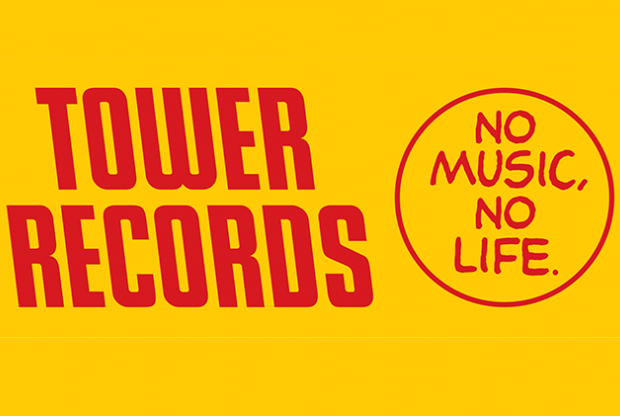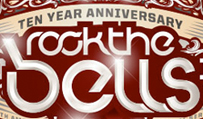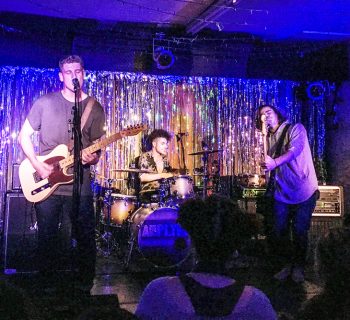Tower Records, the iconic music chain that defined the retail music business in the pre-digital era, is back in business 60 years after Russ Solomon first opened its doors in 1960.
To celebrate its return, Tower Records will offer exclusive merchandise as well as limited edition vinyl releases ahead of exciting partnerships with artists, labels and brands to be announced in early 2021. Along with exclusive Tower Records “Watt Ave” t-shirts commemorating the original Tower Records store in Sacramento, California, music fans can purchase limited edition vinyl including Ghost Dog - Original Motion Picture Score produced by The RZA, now available for the first time ever on vinyl outside of Japan.
This is the first film score produced by The RZA and features appearances by Wu-Tang Clan. The Tower Records exclusive deluxe limited edition colored vinyl features an Opaque Red & Opaque Yellow swirl with only 500 available worldwide.
Tower Records will also be offering an exclusive vinyl edition of Hollywood Undead’s New Empire Vol. 2 featuring transparent red with yellow splatter vinyl. New Empire Vol. 2 officially releases on December 4, 2020 and is Hollywood Undead’s seventh studio album.
Known for its yellow-and-red color scheme, “No Music, No Life” slogan, wide aisles stocked with LPs and CDs, and audiophile staff, Tower Records is transcending its historic past by creating online and physical experiences for all music fans to “Know Music, Know Life.”
“It’s a privilege to help relaunch a brand like Tower Records. As COVID prohibits us from connecting with our customers in a personable way - through brick & mortar stores - an important part of our mission is ensuring our customers at home still receive Tower Records’ in-store experience from our online efforts,” says Danny Zeijdel of Tower Records.
“This involves offering exclusive content catered to the tastes of our loyal customers, like merchandise celebrating the 60th Anniversary and artist, festival and brand collaborations. These limited edition releases from Tower, as well as The RZA and Hollywood Undead, are the first of many and an homage to Tower’s humble beginnings 60 years’ ago – before it grew into a global phenomenon and, for many, a way of life.”
Founded in 1960 by Russ Solomon, Tower Records developed from a business he founded as a teenager to resell 78 rpm jukebox records in his father’s Sacramento drug store, into a record retail behemoth that operated dozens of stores across the United States. Tower Records defined the retail music business in the pre-digital era and at its peak had nearly 200 stores across 15 countries, and more than $1 billion in annual sales.
Known for its enormous volume, and backed by its audiophile behind-the-counter staff, Tower Records became the mecca for in- store performances and recording artist events, placing it at No. 1 among U.S. music merchants. In 2020, Tower Records is transcending its historic past by creating online experiences and exciting partnerships with artists, labels and brands for all music fans to “Know Music, Know Life.”
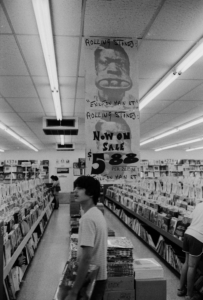
Tower Records Hollywood, CA 1972
Photo by John Van Hamersveld
I went to the 1970 opening of Tower Records on Sunset Boulevard in West Hollywood. The first LP I purchased was Jethro Tull’s Stand Up. I knew the location already. Years earlier I frequented the same space formerly occupied by Earl “Madman” Muntz, who sold cars, installed stereo units and 8-track cartridge players in vehicles.
In 1999, Tower Records made $1 billion. In 2006, the company filed for bankruptcy.
In 2015 the revealing documentary on Tower Records All Things Must Pass was released theatrically by Magnolia Pictures. It provides some answers to what went wrong.
The film is essential viewing for anyone who ever found sound in a record store. It’s an inspiring melodic, spiritual, retail and cautionary celluloid tale from filmmaker Colin Hanks.
Everyone thinks they know what killed Tower Records: The Internet. But that’s not the story. Hanks’ movie investigates this iconic company’s explosive trajectory, tragic demise, and legacy forged by its rebellious Sacramento, California born founder, Russ Solomon.
I interviewed Russ Solomon in 2015 and touted the movie when it was initially screened, and then issued on DVD. My dialogue with founder Solomon was included in my 2020 book Docs That Rock, Music That Matters.
“Tower Records always had the most complete collection of music available to anyone at any time,” stressed Brian Wilson of the Beach Boys in 2015. “Their inventory of every kind of music was just great. They were the best.”
“Tower Records on the Sunset Strip was like Disneyland for music fans,” suggested singer/songwriter Jackie DeShannon. “It wasn’t just a store, it was a destination. You could find everything and the place was always buzzing. Every visit was like going to a great party.”
“One of my ambitions when I first set foot on U.S, soil was to visit Tower Records on Sunset Blvd.,” volunteered singer Joe Elliott of Def Leppard. “This was also in the days before CDs, so it was a ‘real’ record store…
“When I did finally get there I couldn’t believe it, it was so massive, one could spend an entire day in there and only get to see half of what they had…It was essentially a toy shop for grown-ups and boy did we come out of there with armfuls of records! It was a terrific experience, the likes of which I fear may have gone forever, but we live in hope…”
“The supreme music store for a few generations of collectors,” offered Carol Schofield of MsMusic Productions. “Tower was the place to go for music and people watching or quick hook ups. San Francisco’s Bay and Columbus location was the go to place for new releases and simply to find the record that most other places didn’t have. Also, after seeing a band at the Fillmore or Winterland we would head to Tower before midnight to get the latest release of a band we had just heard live. And working there was even better for a record collector, as the saying goes, a kid in a candy store. I spent almost a year employed at the Bay and Columbus location. The only drawback was getting carried away with buying records and then when my paycheck arrived it was a big hoops! Check was low due to buying many records that had been deducted from pay...
“There were on occasion sightings of celebrities in the store. I recall Iggy Pop and Dolly Parton passing through the Bay and Columbus store. Truly the Mutha of all record stores.”
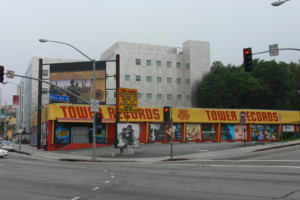
Joe Smith was President and CEO Capitol-EMI Music 1987-1993, Chairman of Elektra/Asylum Records 1975-1983, President of Warner Bros. Records 1972-1975. In 2015 he commented on the legacy of Tower Records.
“Russ Solomon was a head case… He had crazy plans and thoughts. The kicker was that he could and he did make most of them happen. When one of our records got piled up on the floor, it was a reason for celebration. A great story of a great adventure that we in the business believed would have a limited life when the new technology arrived. It did and the great ride ended.”
Harvey Kubernik: Why did you consent to actively participate in this film? How was their pitch?
Russ Solomon: From time to time, people talked to me about doing a book on the company. And a couple of guys started but didn’t get anywhere with it. It’s a pretty arduous thing to do if you gotta have a real job. And then Colin and Sean had this idea they came up with. There was a third partner and he was very good friends with my dentist, and the dentist fixed us up and we had a meeting. And, of course, I told them right off the bat they were nuts. “Why would anyone want to see a movie about a record store?” They persevered, and seven years later there it is… 338 What they did was get a writer and made a story out of it, And, they got a good editor and the whole thing came together. At the end of the day, after initially thinking, “how are they gonna pull this thing off?’ I enjoyed it, actually. And I think it got over the essence of what we were all about.
HK: I think your plan to open a San Francisco store in 1967 was a big factor in expanding the Tower visibility, image and brand. Did the Summer of Love energy play a part in the expansion? You subsequently opened a store in 1968.
RS: Well, it was very serendipitous to say the least. Between 1952 and 1960 I had another little company simultaneously to having a retail store here in Sacramento. We had a company called Record Supply, which was one of the very early rack jobber companies and one stops. And we had an office, a warehouse, in San Francisco, over on Mission. First of all, I was born there. OK? But I never really lived there.
But I always believed that was the place to go and oddly enough, I don’t know why, but it seemed that we shouldn’t be downtown, the business district. We had to be somewhere else that was right. And the accident of finding that place was marvelous. The independent labels that came out of the fifties and early sixties helped drive the retail environment.
The independent guys were the ones who started it and drove it forward. They were pretty marvelous. That was the heyday. People like Syd Nathan at King Records, Gene Norman at GNP Crescendo Records, and the Chess Brothers, the whole history of the Chess Records operation in Chicago. I could see the parallel between the way that business developed, although I never worked in a bar in downtown Chicago, and the rise and demise of that. And, those guys were opportunistic as hell when it came to buying their acts.
On the other hand, they also paid their acts, too, so they made some money. Tower stocked their blues, gave it floor space. I think “my people” knew about it and liked it. If we had a kid in the store who liked blues or country music, we had a lot of blues and country music in that store. You hunt around for somebody to hire who really knows and loves the music. You gotta look at the timing. We really hit it at exactly the right time.
We had all that experience of selling music that came out after World War II; 1946 to 1967, and the idea that the Summer of Love had happened down at Monterey and then Rolling Stone starting in 339 1967, really got going in 1968, the Fillmore just kind of getting started a little before then, all through those formative years, and the kids in Sacramento were going into San Francisco on the weekends, dressing up in what would be now called hippie clothes, and hanging out and bringing back the whole culture that was happening down there. Sacramento was not that at all.
We were hanging on to the coat tails of that, but Tower and us moved into San Francisco and became part of that swirl. I like to say that we got on the wave and we rode the damn thing until we ran ashore. And, it could not have been a more perfect spot. From a standpoint of timing, it was an accident. The combination of Bill Graham, the Fillmore, Rolling Stone, and us, in the very beginning for a little while, we were their number one sales outlet. They could put a whole pile of magazines in and they’d all get sold. Tower was a destination stop. People saw one of Graham’s shows then went into the store and got an album. Not from the headliner but one of the opening acts.
HK: Your concept of management.
RS: I always belonged to what I call the “Tom Sawyer Theory of Management.” He sat back and watched the other people paint the fence. That’s a good idea. First of all, they know more than I do. And they are on the street with it. What am I gonna do? Press my word or my tastes and everything else on them? Not a good idea. It was just a natural thing. I was also lucky, growing up in the retail business, at my dad’s drug store, I started working there when I was 13-years-old, and he was a loose kind of guy. He was not a micro-manager or anything. He went into business without any money at all and worked hard and made a good living out of it. To me the whole idea was natural. It wasn’t learned anyplace except intuitively and probably a certain amount of laziness.
One of the sadder stories about this, and in the movie, later on, when we got into financial trouble and so on, and the banks put on inexperienced people who did micro-manage, who did go for central buying and things like that, which I felt was a terrible idea. I fought it but I got nowhere.
(Harvey Kubernik is the author of 19 books, including Canyon Of Dreams: The Magic And The Music Of Laurel Canyon and Turn Up The Radio! Rock, Pop and Roll In Los Angeles 1956-1972. Sterling/Barnes and Noble in 2018 published Harvey and Kenneth Kubernik’s The Story Of The Band: From Big Pink To The Last Waltz. For summer 2021 the duo has written a multi-narrative book on Jimi Hendrix for the publisher.
Otherworld Cottage Industries in July 2020 published Harvey’s 508-page book, Docs That Rock, Music That Matters, featuring Harvey’s interviews with D.A. Pennebaker, Chris Hegedus, Albert Maysles, Murray Lerner, Morgan Neville, Curtis Hanson, Michael Lindsay-Hogg, Andrew Loog Oldham, Dick Clark, Ray Manzarek, Travis Pike, Allan Arkush, and David Leaf, among others.
In 2020 Harvey served as Consultant on Laurel Canyon: A Place In Time documentary directed by Alison Ellwood which debuted in 2020 on the EPIX/MGM television channel.
Kubernik’s writings are in several book anthologies, most notably The Rolling Stone Book Of The Beats and Drinking With Bukowski.
Harvey penned a back cover endorsement for author Michael Posner’s book on Leonard Cohen that Simon & Schuster, Canada published in October 2020, Leonard Cohen, Untold Stories: The Early Years)

